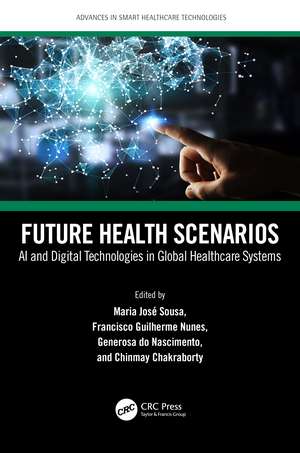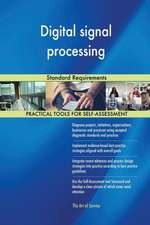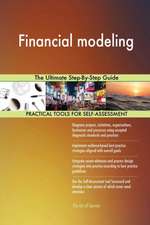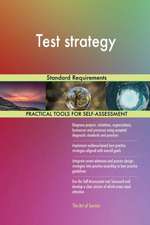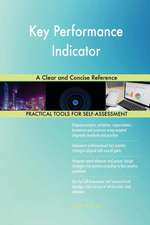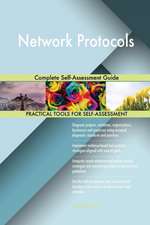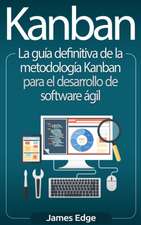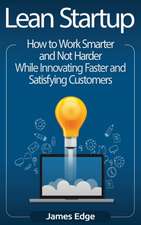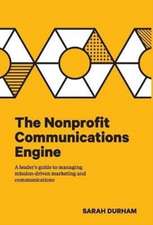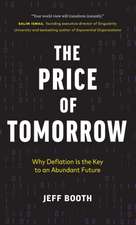Future Health Scenarios: AI and Digital Technologies in Global Healthcare Systems: Advances in Smart Healthcare Technologies
Editat de Maria José Sousa, Francisco Guilherme Nunes, Generosa do Nascimento, Chinmay Chakrabortyen Limba Engleză Hardback – 15 mai 2023
Features:
- Focuses on prospective scenarios in health to predict possible futures.
- Addresses the urgent needs of the key population, socio-technical and health themes.
- Covers health innovative practices as 3D models for surgeries, big data to treat rare diseases, and AI robot for heart treatments.
- Explores telemedicine using big data, deep learning, robotics, mobile and remote applications.
- Reviews public health based on predictive analytics and disease trends.
Preț: 822.38 lei
Preț vechi: 1027.97 lei
-20% Nou
Puncte Express: 1234
Preț estimativ în valută:
157.41€ • 171.04$ • 132.31£
157.41€ • 171.04$ • 132.31£
Carte tipărită la comandă
Livrare economică 21 aprilie-05 mai
Preluare comenzi: 021 569.72.76
Specificații
ISBN-13: 9781032131498
ISBN-10: 1032131497
Pagini: 290
Ilustrații: 44 Tables, black and white; 40 Line drawings, black and white; 5 Halftones, black and white; 45 Illustrations, black and white
Dimensiuni: 156 x 234 x 18 mm
Greutate: 0.59 kg
Ediția:1
Editura: CRC Press
Colecția CRC Press
Seria Advances in Smart Healthcare Technologies
ISBN-10: 1032131497
Pagini: 290
Ilustrații: 44 Tables, black and white; 40 Line drawings, black and white; 5 Halftones, black and white; 45 Illustrations, black and white
Dimensiuni: 156 x 234 x 18 mm
Greutate: 0.59 kg
Ediția:1
Editura: CRC Press
Colecția CRC Press
Seria Advances in Smart Healthcare Technologies
Public țintă
Academic and PostgraduateCuprins
1. Scenarios For The Future Of Healthcare-Moving Towards Smart Hospitals. 2. People Management In Healthcare – The Challenges In The Era Of Digital Disruption. 3. Title: Managing Acute Patient Flows In Hospitals. 4. Influence Of Commercial Excellence And Digital In Healthcare Professionals Relationships Management: A Pharmaceutical Focus Group Study. 5. Psychology On The Edge Of Health Tech Challenges. 6. Perceptions Of Clients On Quality Of Health Services . 7. Innovation Management Applied To Primary Care: An Integrative Review. 8. Title: The Spinner Innovation And Knowledge Flow For Future Health Scenarios Applications. 9. Reshaping Flows In Healthcare Systems? Digital Technologies Are The Perfect Ally. 10. Work With Me, Don’t Just Talk At Me: When “Explainable” Is Not Enough.. 11. Application Of Mobile Technologies In Healthcare During Coronavirus Pandemic Lockdown. 12. Application Of Pattern Recognition In Taste Perception For Healthcare: An Exploratory Study. 13. New Perspectives For Knowledge Management In Telemedicine. Preliminary Findings From A Case Study In The Covid-19 Era. 14. Prioritization Of Quality Of Public Health Services In The Sector Of Graphic Methods: University Hospital. 15. Telework And Conflict (Work-Family And Work-Family): What Is The Effect On Occupational Stress?
Notă biografică
Maria José Sousa (PhD in Management) is a University Professor with Habilitation and a research fellow at ISCTE/Instituto Universitario de Lisboa. Her research interests currently are public policies, information science, innovation and management issues. She is a best-selling author in Research Methods, ICT and People Management and has co-authored over 100 articles and book chapters and published in several scientific journals (i.e. Journal of Business Research, Information Systems Frontiers, European Planning Studies, Systems Research e Behavioral Science, Computational and Mathematical Organization Theory, Future Generation Computer Systems, and others). She has also organised and peer-reviewed international conferences and is the guest-editor of more than five Special Issues from Elsevier and Springer. She has coordinated several European projects of innovation and is also External Expert of COST Association – European Cooperation in Science and Technology and is former President of the ISO/TC 260 – Human Resources Management, representing Portugal in the International Organisation for Standardisation.
Francisco Guilherme Nunes, before joining ISCTE-IUL in a full-time position (2005), worked as HRM consultant for five years and Marketing Researcher for ten years. After 2005, he taught several courses in HRM and Applied Research Strategies. It was the manager of several programmes in the HRM field (undergraduate, master and Ph.D. levels). He was the Director of the Human Resource and Organisational Behaviour Department for four years. More recently, he shifted his career to a more research orientation. His research interests are the determinants of organisational performance, organisational identity, and leadership development, especially in highly institutionalised contexts like healthcare services or public and non-profits.
Generosa do Nascimento is a PhD in Management, specialising in Human Resources and Organisational Behaviour, by ISCTE-IUL. She is Assistant Professor at the Department of Human Resources and Organisational Behaviour at ISCTE Business School. She is Director of the Executive Master in Strategic People Management and Leadership, of the Executive Master in Healthcare Services Management and of the Post-Graduation at ISCTE Executive Education. The main areas of research are healthcare management and strategic people management. She has been a member of boards of directors (or adviser) and has extensive consulting experience in strategic people management, healthcare services management and organisational change in multiple organisations, private, public and social economy, across different business sectors.
Chinmay Chakraborty, SMIEEE, is an Assistant Professor in Electronics and Communication Engineering, Birla Institute of Technology, Mesra, India, and postdoctoral fellow of Federal University of Piaui, Brazil. His main research interests include the Internet of Medical Things, wireless body sensor networks, wireless networks, telemedicine, m-health/e-health, and medical imaging.
Francisco Guilherme Nunes, before joining ISCTE-IUL in a full-time position (2005), worked as HRM consultant for five years and Marketing Researcher for ten years. After 2005, he taught several courses in HRM and Applied Research Strategies. It was the manager of several programmes in the HRM field (undergraduate, master and Ph.D. levels). He was the Director of the Human Resource and Organisational Behaviour Department for four years. More recently, he shifted his career to a more research orientation. His research interests are the determinants of organisational performance, organisational identity, and leadership development, especially in highly institutionalised contexts like healthcare services or public and non-profits.
Generosa do Nascimento is a PhD in Management, specialising in Human Resources and Organisational Behaviour, by ISCTE-IUL. She is Assistant Professor at the Department of Human Resources and Organisational Behaviour at ISCTE Business School. She is Director of the Executive Master in Strategic People Management and Leadership, of the Executive Master in Healthcare Services Management and of the Post-Graduation at ISCTE Executive Education. The main areas of research are healthcare management and strategic people management. She has been a member of boards of directors (or adviser) and has extensive consulting experience in strategic people management, healthcare services management and organisational change in multiple organisations, private, public and social economy, across different business sectors.
Chinmay Chakraborty, SMIEEE, is an Assistant Professor in Electronics and Communication Engineering, Birla Institute of Technology, Mesra, India, and postdoctoral fellow of Federal University of Piaui, Brazil. His main research interests include the Internet of Medical Things, wireless body sensor networks, wireless networks, telemedicine, m-health/e-health, and medical imaging.
Descriere
This book provides unique multidisciplinary approach for exploring the potential contribution of AI and digital technologies in enabling global healthcare systems to respond to urgent twenty first century challenges. Deep analysis has been made regarding telemedicine using big data, deep learning, robotics, mobile and remote applications.
